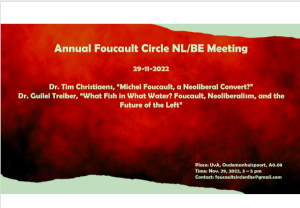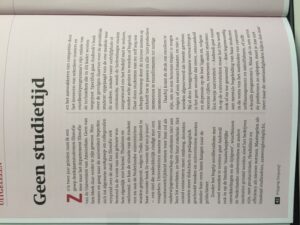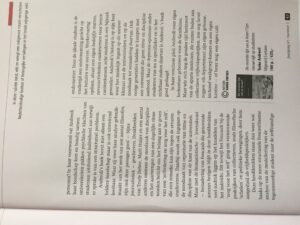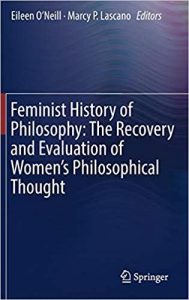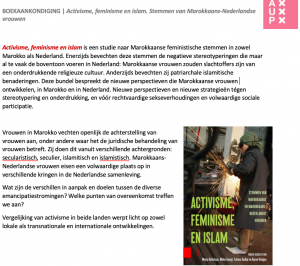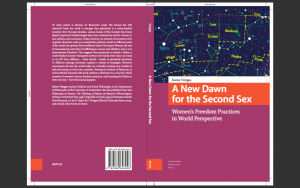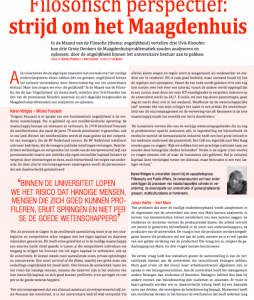Dr Karen Vintges
2020 – present: Associate Researcher at the Amsterdam Institute for Humanities Research of the University of Amsterdam
1992-2020: Assistant Professor Political and Social Philosophy – Department of Philosophy, University of Amsterdam
1985-1989: PhD fellow – University of Amsterdam
1980-1985: Scientific Assistant, Social Philosophy, Centrale Interfaculteit, University of Amsterdam
- Founding member en Bestuurslid van de stichting Krisis, Journal for Contemporary Philosophy
- Founding member of the Dutch/Belgian Society for Women in Philosophy (SWIP.NL/BE)
- Founding member of the Foucault Circle NL/BE
- Founding member en bestuurslid van de Filosofische Kring Amsterdam
Vintges a.o. published Philosophy as Passion. The Thinking of Simone de Beauvoir Bloomington: Indiana University Press, 1996 [originally in Dutch, 1992]); Feminism and the Final Foucault, ed. by D. Taylor & K.Vintges (Illinois University Press, 2004), A New Dawn for the Second Sex (Amsterdam University Press 2017) and several other books in Dutch.
Beauvoir and Politics… Symposium and Book Launch / Berlin / June 25 2024
Accepted for publication: K. Vintges, ‘De nieuwe filosofes.’ Historica – forthcoming
Just published
K.Vintges, ‘Power, Sex, and Myth: Beauvoir, Paglia, and Peterson.’ In: Dufourcq, A et al. (eds.) 2024. Purple Brains: Feminisms at the Limits of Philosophy. Nijmegen: Radboud University Press, 66-77.
=================================
Purple Brains. Radboud University Press (2024)
https://radbouduniversitypress.nl/site/books/e/10.54195/HSOV8373/
Feminist philosophy seems to always exceed its own limits – it is dynamic, shifting, and in dialogue with other academic disciplines. The adjective “feminist” marks not so much a specific subfield of philosophy or topic that is studied, but a political sensibility, an engagement in practicing philosophy. The playful title ‘Purple Brains’ indicates a thinking that goes beyond established binaries, notably the gender binary signified by the colors pink and blue.
As feminists, we face the challenge of finding our own place and inventing ways to understand and overcome discrimination and exclusion. Situated within a world we want to change, feminists cannot afford to reject unlikely interlocutors out of hand, but must instead engage in interdisciplinary, intergenerational and cross-fertilizing dialogues.
This volume brings together 19 articles that practice feminist philosophy through an engagement with the work of Dutch philosopher Veronica Vasterling. As one of the pioneering women philosophers active in Dutch academia since the mid-1980s, Vasterling explicitly expanded her outlook to embrace feminist themes and authors. She stands out as a prominent figure in the exploration of the boundaries of feminism through critical dialogue across multiple perspectives. Her work not only explores neuropsychology through a feminist lens but also extends into domains such as critical phenomenology of gender and race, critical hermeneutics, and subjects including sexual difference, the philosophical oeuvre of Hannah Arendt, and that of Judith Butler.
================
Beauvoir and Politics. Routledge (2024)
https://www.routledge.com/Beauvoir-and-Politics-A-Toolkit/Schoonheim-Vintges/p/book/9781032431918
Approaching Simone de Beauvoir’s feminism and social commentary as a resource to understand our current crises, Beauvoir and Politics: A Toolkit brings together established and emerging scholars to apply her insights to gender studies, political philosophy, decolonisation, intellectual history, age theory, and critical phenomenology. The essays in this collection start from key concepts in Beauvoir’s oeuvre and relate them to contemporary debates, asking how her notion of ambiguity speaks to lived experiences that have been highly politicized in recent years, such as pregnancy, old age, sexual violence, and the exposure of black and brown bodies to police violence; how myths inform our notions of collective, national identities, as well as notions of masculinity and femininity; and how she provides conceptual tools that help to theorize the various political strategies that are used to challenge gendered and racialized systems of oppression. These and other issues are central to this critical appraisal of Beauvoir’s legacy, demonstrating the contemporary relevance of her thought as it diagnoses the present and looks toward change for a better future. This book will be of great interest to undergraduate and postgraduate students looking to engage with the political content of Simone de Beauvoir’s work and the timely application of her ideas.
https://krisis.eu/article/view/40981
Krisis / Vol. 43 No. 1 (2023)
K. Vintges, ‘Taal, macht en identiteitspolitiek: een kritische blik op Gijs van Oenen’s Culturele veldslagen.’
Review of Gijs van Oenen (2022). Culturele veldslagen: Filosofie van de culture wars. Amsterdam: Boom
Emancipation is good, identity politics is wrong, is the essence of the message in Culturele veldslagen: Filosofie van de culture wars, the recent book by Dutch political philosopher Gijs van Oenen. Critique of identity politics, especially in its “woke” form, is nothing out of the ordinary in today’s context. Van Oenen’s analysis that there exists an identity politics of both the right and the left is not new, nor is his “solution” – namely, liberalism and the rule of law. We can find both of these in, for example, Anthony Appiah’s The Lies That Bind: Rethinking Identity (2019). What is new, however, is that Van Oenen – who identifies as a left-wing intellectual – is using labels that are currently common in the alt-right sphere. The terms “cultural Marxism,” and “culture wars” – as seen in the title of his book – are presented by Van Oenen as neutral, but the question is what he brings in with that.
===========================================================
https://www.spui25.nl/programma/macht-seks-en-mythe
===========================================================
open access: A New Dawn for the Second Sex
======================
Other recent contributions / recente bijdragen
K.Vintges, ‘Geen studietijd’. Wijsgerig Perspectief, 1, 2021, 42-43. Bespreking van: Toske Andreoli, De mooiste tijd van je leven? Een nieuwe kijk op studiestress. Amsterdam: Uitgeverij Lontano.
https://www.filosofie.nl/geen-studietijd/
K.Vintges, ‘Forty years of academic philosophy in the Netherlands: from pluralism to ‘normal philosophy”/ Krisis / december 2020
https://krisis.eu/article/view/36964
Abstract: Although for a long time, Dutch academic philosophy was characterized by a pluralism of – imported – philosophical frameworks and paradigms, in more recent decades, a type of ‘normal philosophy’, in the Kuhnian sense, has become dominant which aims to solve ethical and political problems and dilemmas through rational-normative argumentation. Contrary to what is often claimed, the new ‘normal philosophy’ amounts not to thinking ‘beyond the analytic-continental divide’ in a fruitful synthesis, but to the subsumption of continental philosophical themes and concepts under the analytic tradition. The potentially critical tenor of continental philosophy threatens to be ‘solved’ by this subsumption. ‘Normal philosophy’, with its emphasis on rational-normative argumentation, risks leading to a state philosophy that fits in with existing policy questions, ignoring systemic and structural power inequalities. I argue that the journal Krisis, in keeping with its original principles, should hang on to critical philosophical reflection, which today is needed more than ever, specifically – pace current right-wing and left-wing populist attacks on identity politics – on systemic, multiple forms of deprivation and oppression.
De universitaire filosofie in Nederland kenmerkte zich een tijd lang door een pluralisme van – geïmporteerde – stromingen. Maar de laatste decennia heeft zich een type ‘normal philosophy’ uitontwikkeld, in Kuhniaanse zin, dat gericht is op het systematisch, via rationeel-normatieve argumentatie, oplossen van een ethisch of politiek of sociaal probleem of dilemma. Anders dan geclaimd gaat het hier niet om een denken ‘beyond the analytic -continental divide’ in de vorm van een vruchtbare synthese, maar om een subsumptie van continentaal filosofische thema’s en concepten onder de analytische traditie. De in potentie kritische strekking van de continentale filosofie dreigt door deze subsumptie te worden ‘opgelost’. De nieuwe ‘normal philosophy’ met haar nadruk op rationeel-normatieve argumentatie, riskeert uit te monden in een staats-filosofie die aansluit bij bestaande beleidsvragen, zonder oog te hebben voor systemische en structurele machtsongelijkheden. Het tijdschrift Krisis moet – in overeenstemming met zijn oorspronkelijke uitgangspunten – de meer dan ooit nodige kritische filosofische reflectie leveren, op systemische, meervoudige vormen van achterstelling en onderdrukking – pace de huidige links- en rechts-populistische aanvallen op identiteitspolitiek.
=============================================
https://link.springer.com/chapter/10.1007/978-3-030-18118-5_11
Vintges 2019 – in:
FORUM PENSER AVEC SIMONE DE BEAUVOIR AUJOURD’HUI
https://penseravecsdb.sciencesconf.org/program/graphic/date/2018-10-11
11-13 OCTOBRE 2018
Université de Paris-Diderot
Jeudi 11 octobre de 13:00 à 17 : 30 deux Sessions parallèles
SESSION I
14:45-16:15 Panel 2 Diverse Experiences
Chair: Nathalie Nya, Carroll University, USA,
- Sarah M. Gorman, Vanderbilt University, USA, The Coming of Age and Disability Studies
- Alexander Antonopoulos, Concordia University, Canada, Two New Conceptions of “Experience”: Problematizations from Beauvoir’s Political Writings and Philosophical Writings
- Karen Vintges, University of Amsterdam, Netherlands, Feminism Versus Neoliberalism: Women’s Freedom Practices in World Perspective
https://www.filosofie.nl/nl/artikel/hitlist/251/1/index.html [voorpublicatie]
https://www.folia.nl/opinie/119698/studenten-met-problemen-help-je-bij-de-huisarts-niet-met-e-health
[Voor een indruk van de achtergrond van onze kritische vragen, zie bv. het boek Identiteit (2013) van psycholoog en psychoanalyticus prof. Paul Verhaeghe / Universiteit Gent]
Voor de reactie van prof. Reinout Wiers / UvA zie
****
https://medium.com/@dodedenkers/simone-de-beauvoir-on-metoo-c2e210bd3e82
Radio KLARA d.d 12-02 -2018 en 15-02-2018:
https://itunes.apple.com/be/podcast/podcast-bar-de-beauvoir/id1344726118?l=nl&mt=2
===========================================================
iinterview door Ischa Meijer [uit 1992] – vanaf minuut 42
=================================================
open access A New Dawn for the Second Sex:
http://www.oapen.org/search?keyword=9789089646026
A New Dawn for the Second Sex, Amsterdam University Press, 2017, 196 pp.
To what extent is Simone de Beauvoir’s study The Second Sex still relevant? From her work it emerges that patriarchy is a many-headed monster. Over the past decades, various heads of this monster have been slayed: important breakthroughs have been achieved by and for women in law, politics, and economics. Today, however, we witness movements in the opposite direction, such as a masculinist political revival in different parts of the world, the spread of the neoliberal myth of the Super Woman, the rise of transnational networks of trafficking in women and children, and a new international ‘Jihadism’. This suggests that patriarchy is indeed a Hydra: a multi-headed monster that grows several new heads every time one head is cut off. Since different – often hybrid – heads of patriarchy dominate in different settings, feminism requires a variety of strategies. Women’s movements all over the world today are critically creating new models of self and society in their own contexts. Drawing on notions of Beauvoir, as well as Michel Foucault, this book outlines a ‘feminism in a new key’ which consists of women’s various freedom practices, each hunting the Hydra in their own key – but with mutual support.
REVIEWS:
https://www.nrc.nl/nieuws/2017/02/16/nog-altijd-moeder-maagd-of-hoer-6734739-a1546401
http://hypatiareviews.org/reviews/content/331
===========================================================
https://www.filosofie.nl/nl/artikel/48506/dood-aan-de-mythe-van-de-supervrouw.html
http://dorudi.nl/multiple-feminisms/
Babel februari 2017: De Terugblik / Interview met FGw-docent Karen Vintges
Intellectuele uitwisseling in het café
[Tekst] Gwyneth Sleutel / [Beeld] Joy van Wooning
http://www.groene.nl/artikel/de-vijf-beste-romans-van-simone-de-beauvoir-volgens-karen-vintges
In: Babel -april 2015





